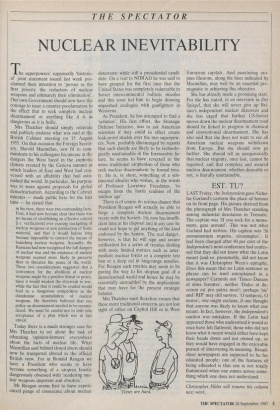THE SPECTATOR
NUCLEAR INEVITABILITY
The superpowers' supposedly 'historic- al' joint statement issued last week pro- claimed their intention to 'pursue as the first priority the reduction of nuclear weapons and ultimately their elimination'. Our own Government should now have the courage to issue a counter-proclamation to the effect that to seek complete nuclear disarmament or anything like it is as dangerous as it is futile.
Mrs Thatcher should simply reiterate and publicly endorse what was said at the British Cabinet meeting on 15 August 1955. On that occasion the Foreign Secret- ary, Harold Macmillan, saw fit to com- municate to his colleagues his unease at the dangers the West faced in the euphoric climate created by the Geneva summit at which leaders of East and West had con- versed with an affability that had asto- nished the world. In particular, his purpose was to warn against proposals for global denuclearisation. According to the Cabinet minutes — made public here for the first time — he stated that
in his view, there were two outstanding facts. First, it had now become clear that there was no means of establishing an effective control [i.e. verification] over existing stockpiling of nuclear weapons or new production of fissile material, and that it would before long become impossible to control the means of launching nuclear weapons. Secondly, the Russians had now recognised the full dangers of nuclear war and the existence of nuclear weapons seemed more likely to preserve than to threaten the peace of the world. These two considerations suggested that a convention for the abolition of nuclear weapons might be a positive threat to peace, since it would weaken the deterrent to war, while the fact that it could be evaded would lead to a dangerous competition in the clandestine accumulation of nuclear weapons. He therefore believed that our policy on disarmament needed to be reconsi- dered. We must be careful not to drift into acceptance of a plan which was in fact unreal.
Today there is a much stronger case for Mrs Thatcher to set about the task of educating 'opinion-formers' everywhere about the facts of nuclear life. What Macmillan said behind closed doors should now be trumpeted abroad as the official British view. For in Ronald Reagan we have a President who seems to have become something of a utopian fanatic dangerously obsessed with 'rendering nuc- lear weapons impotent and obsolete'.
Mr Reagan seems first to have experi- enced pangs of conscience about nuclear deterrents while still a presidential candi- date. On a visit to NORAD he was said to have grasped for the first time that the United States was completely vulnerable to Soviet intercontinental ballistic missiles and this soon led him to begin drawing anguished analogies with gunfighters in Westerns.
As President, he has attemped to find a `solution'. His first effort, the Strategic Defense Initiative, was to ask American scientists if they could in effect create leak-proof shields over the two superpow- ers. Now, probably discouraged by reports that such shields are likely to be technolo- gically unattainable in the foreseeable fu- ture, he seems to have reverted to the more traditional utopianism of those who seek nuclear disarmament by formal trea- ty. He is, in short, something of a sen- timental idealist who wishes, in the words of Professor Lawrence Freedman, `to escape from the harsh realities of the nuclear age'.
There is of course no serious chance that President Reagan will actually be able to forge a complete nuclear disarmament treaty with the Soviets. He now has insuffi- cient time at his disposal and in any case he could not hope to get anything of the kind endorsed by the Senate. The real danger, however, is that he will sign and secure ratification for a series of treaties dealing with more limited matters such as inter- mediate nuclear forces or a complete test ban or a deep cut in long-range missiles. For Reagan such treaties may seem to be paving the way to his utopian goal of a denuclearised world and hence he may be essentially untroubled by the implications that may have for the present strategic balance.
Mrs Thatcher must therefore ensure that these more traditional concerns are not lost sight of either on Capitol Hill or in West `Times are hard.' European capitals. And puncturing uto- pian illusions, along the lines indicated by Macmillan, may well be an essential pre- requisite to achieving this objective.
She has already made a promising start. For she has stated, in an interview in Der Spiegel, that she will never give up Bri- tain's independent nuclear deterrent and she, has urged that further US-Soviet moves down the nuclear disarmament road should be linked to progress in chemical and conventional disarmament. She has also said that she does not want to see all American nuclear weapons withdrawn from Europe. But she should now go further. She should tell us unequivocally that nuclear virginity, once lost, cannot be regained; and that complete and assured nuclear disarmament, whether desirable or not, is literally unattainable.






























































 Previous page
Previous page